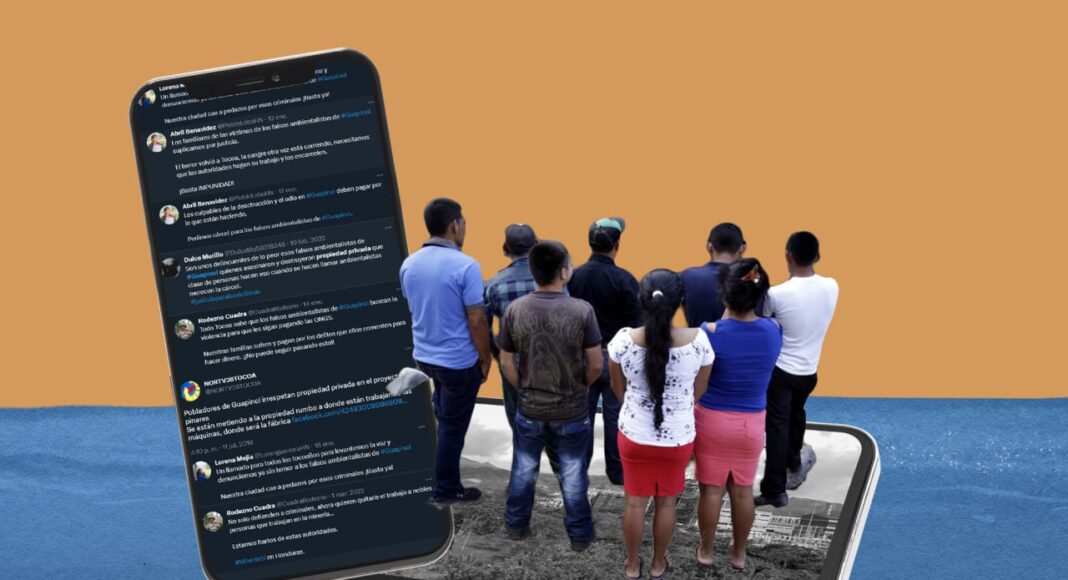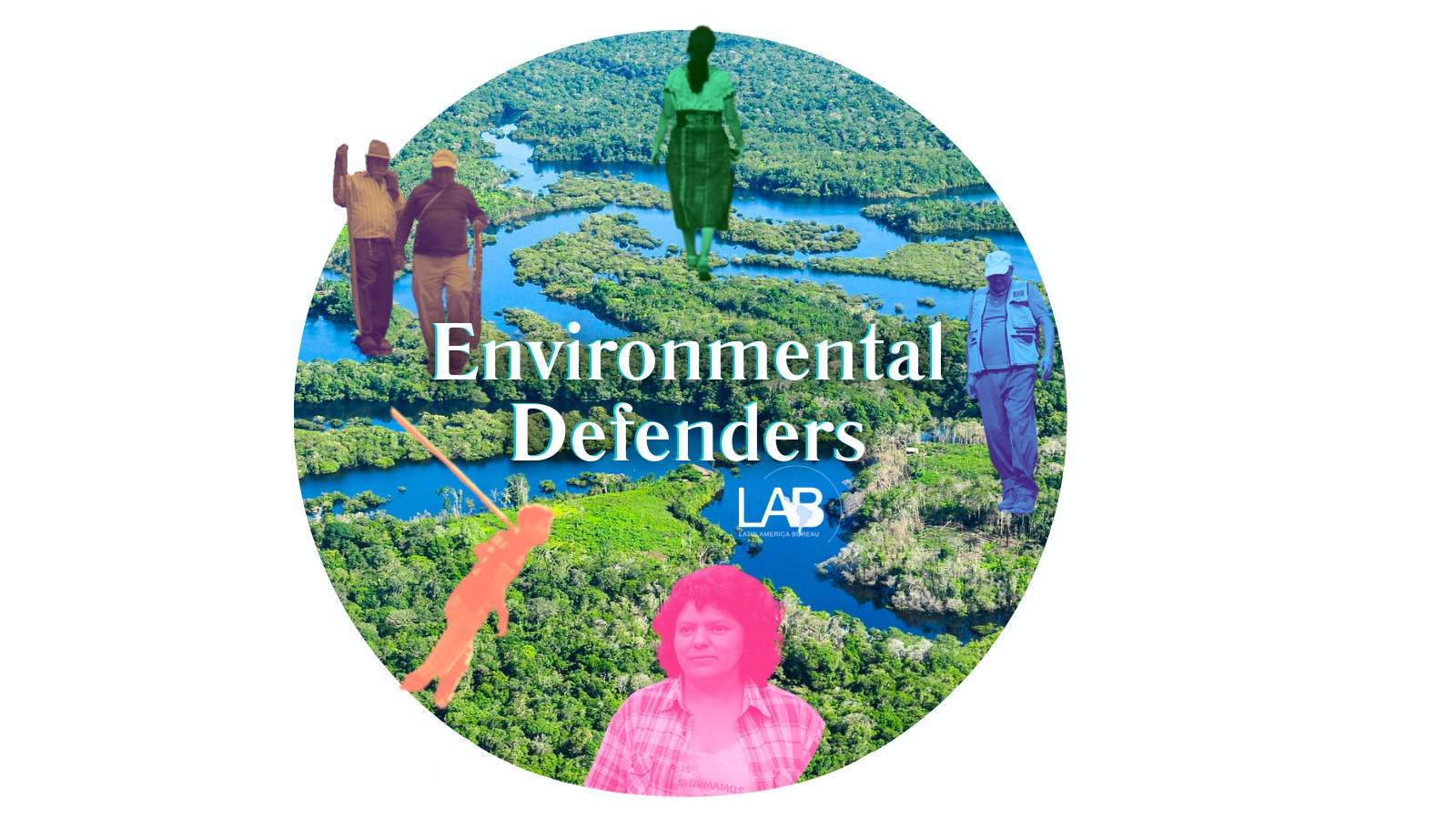A day after two well-known environmentalists from Guapinol were murdered, a Twitter smear campaign dating back to 2021 intensified once again. The campaign accuses members of an environmentalist group which opposes a mine development of being ‘fake environmentalists’ and taking part in the murders of 10 people in the thick of the conflict. An analysis carried out by our series partner Contracorriente, with support from experts, has determined that this campaign created and disseminated false content in a coordinated manner. Digital evidence is illustrated in the original article in Spanish. Here, it has been translated into English by Morgan Fairless.
Community activists from Guapinol, Tocoa, in the Honduran province of Colón, have been challenging a mining project within a nature reserve by the company Los Pinares since 2016. At least 15 fake accounts have tweeted messages accusing them of being ‘fake environmentalists’ and ‘murderers’.
The accounts have taken part in a coordinated campaign to smear the activists’ reputation in the public eye at three key moments in the conflict against the mining development since 2021: firstly, when a group of environmentalists were released after being imprisoned for various crimes related to their protests; second, when two environmentalists were killed; and third, when political ties between businessman Lenir Pérez —who owns the mining concession— and the current government of President Xiomara Castro were revealed.
On 25 January 2023, the company Inversiones Los Pinares issued a press release demanding investigations into the murders of 10 people they say were collaborating with the mining project. This claim was amplified in the Twitter campaign’s messaging. Several media outlets such as El Espectador (Honduras), Tocoa Exclusivas, and Radio Globo repeated these messages as part of their news content. Los Pinares also organized a widely-covered press conference. This damaging characterization of the environmental campaign’s leaders was also repeated in meetings covered by the press, such as those organized by leaders of 13 Tocoa communities with the U.S. Embassy and the Office of the United Nations High Commissioner for Human Rights, according to information released by the company.
Experts describe the content of the social media campaign promoted by the company as ‘inauthentic and coordinated’. Most of the accounts involved were created on the same day, using images taken from other internet sites. Additionally, at least 50 to 80 per cent of tweets responded to a set of messages that were generated on the same days in an orchestrated manner.
This type of massive dissemination of fake campaigns on social networks is not a new issue and has taken place in Honduras before. In 2018, Facebook shut down hundreds of fake accounts created to carry out a coordinated campaign in support of former president Juan Orlando Hernández, now extradited to the United States on drug trafficking charges.
A wolf in sheep’s clothing
This ‘fake environmentalist’ narrative was used before by Los Pinares when, in 2020, it responded to journalist Jared Olson’s claims in an article on the conflict in Guapinol published for the U.S. newspaper The Nation. The company replied to the article:
‘Unfortunately, this group of unscrupulous environmentalists launches attacks due to their own private interests. Providing no proof, they accuse respectable people who have decided to invest in an area where few investors dare to do so, due to the legal insecurity caused by invaders by trade who obtain economic benefits from their activities.’
In 2021, this narrative gained traction once more on social media. The keywords ‘fake environmentalists’ and ‘Guapinol’ were used on Twitter for one of the first times on 30 October 2021 by user @PieldeLoboHN. This was in reply to a tweet by the Spanish Embassy calling on Honduras to abide by the rule of law and United Nations recommendations in the Guapinol case. @PieldeLoboHN claimed that 10 people were killed by the ‘fake Guapinol environmentalists’. The tweet used an image with a graphic design similar to a post on the Facebook page ‘Tocoa Exclusivas HN’. The same image continued to appear on other accounts as part of the campaign until January 2023. Through hash tables, a method used to analyse massive data structures and their sources, Contracorriente verified that the images shared by various Twitter and Facebook accounts came from the same source, proving that the campaign was coordinated by a single person. [See the original article for digital evidence.]
The account Piel de lobo has not always gone by that name. In 2012, when the account was created, its name was @SaulvLAPRENSA. This could be verified because the identifier 858840625 (a number that is created when an account is opened and does not change despite changing names) is the same for both handles.
In addition, other tweets that tagged the user @SaulvLAPRENSA can be found in old conversations that tag @PieldeLoboHN. The account @SaulvLAPRENSA made reference in several tweets to the journalistic work of Saúl Vásquez. Vásquez worked at Diario La Prensa until 2021 and, according to his Linkedin account, is now a freelancer offering services in ghostwriting, blogging, and public relations. Several Diario La Prensa journalist handles use the same format, and tweets from Diario La Prensa mention work by @SaulvLAPRENSA as a journalist. [See the original article for digital evidence.]
Contracorriente contacted Saúl Vásquez to inquire about his potential relationship with Los Pinares and the agency that handles public relations for the mining company and other companies owned by Lenir Pérez, asking him to explain why his Twitter account was coordinating this campaign. Vásquez responded that he has no relation to this case and that his work with the company has only been on educational issues, which have nothing to do with the problems in Guapinol and the conflict. He also said that he has never used false accounts and that @SaulvLAPRENSA was an account opened for him by his old newspaper which he has no control of, suggesting that he has another official account.
Contracorriente also consulted a public relations agency after being directed to it by Los Pinares’ lawyer, Erick Spears. The agent suggested that they had hired Saúl on some occasions as a supplier to take photographs, but that he has nothing else to do with the agency or the mining company.
For his part, Juan López, one of the environmentalists who appears in the images and is accused of being a ‘fake environmentalist’ and involved in murders, told Contracorriente that ‘[the smear campaign] generates [a feeling of] insecurity; beyond what someone says on a Facebook page or a few networks, there is someone behind it who is designing everything, the images have a well-structured style and of course that generates fear and confusion within the movement [to defend Guapinol]. Yesterday they had a press conference with a very strong message and that makes us fear that the company could attack one of our collaborators and say that one of us was [responsible]. It is a scenario that we have already experienced in 2018 and 2019 and we are living it right now. It is a moment of crisis for the social movement.’
Another user who appears in the coordinated campaign is @LaPeccora, which in Italian means ‘the sheep’. This user tweeted 47 times about ‘fake environmentalists,’ but only 2 per cent of its tweets refer to environmentalists. Most of those tweets are retweets from other members of the network such as @AntunezArriaga, @LorenguerreraHN and @PieldeLoboHN. The user has no face in their profile picture.
A trial against some Guapinol environmentalists was held on 1 December 2021, after the smear campaign began on Twitter on 30 October of the same year. The trial was observed by several human rights organizations to ensure that due process was guaranteed for the defendants. In February 2022, eight of the defendants were found guilty. A few days later, a sentencing court reversed the conviction and freed the environmentalists. National and international organizations celebrated this decision after the environmentalists had been in pre-trial detention for 40 months.
Meanwhile, messages against the environmentalists were swarming through in the form of replies to various embassies’ Twitter posts, including the European Union, Spain, and France. Several accounts began posting the same narrative, including one account (@LorenguerreraHN) which, immediately after being created on 30 October 2021, began posting messages that same day sharing the campaign’s narrative. Several of its tweets were replies to comments from foreign diplomatic missions requesting the release of the Guapinol environmentalists. After 28 December of that year, the tweets stopped completely until resuming again on 7 January 2022 with 23 tweets on the same day. During January, the campaign intensified.
It kept intensifying up until February 2022 when the environmentalists were released and it ceased thereafter.
After several months of silence, the campaign reactivated in January 2023 following the murder of two Guapinol defenders, with some peaks of activity during that month. One of these, on 13 January 2023, coincided with a press conference by the Coalición contra la Impunidad (national NGO Coalition Against Impunity made up of 55 Honduran organizations) addressing Contracorriente’s reporting on the links between businessman Lenir Peréz and the Minister of the Interior, Tomás Vaquero.
For example, the account @AnaMara2021 posted the same message 21 times on different dates. This level of repetition is typical of a semi-automated network, in which messages are programmed day by day, but operated by a person in reaction to relevant events that they want to influence.
According to Aldo Salgado, an expert on the subject and the coordinator of Laboratorio Ciudadano digital rights platform, these influence campaigns are usually executed by states, political parties, and companies as a ‘tool for the reproduction of power and domination’.
‘Even with changes in the media, the actors of persuasion and influence are still the same, and remain of the same moral stature as Eduard Bernays, who is known as the father of modern public relations, but was also the influential agent that convinced the CIA to carry out a coup d’état in Guatemala to defend the interests of a banana company,’ explained Salgado.
Salgado added that these influence operations are part of public relations packages offered by advertising and political communication agencies to manipulate public opinion.
The conflict in Guapinol has worsened after the murder of Aly Magdaleno Domínguez Ramos and Jairo Bonilla Ayala, two members of the community’s environmental committee, and the public denouncement by Los Pinares of the murder of 10 people they claim were their collaborators. All of these cases have gone unpunished. Colón remains in a state of emergency and ceasefire. But despite these measures, the rates of violence remain high.

This article was originally published in Spanish by our series partner, Contracorriente. It was translated into English by Morgan Fairless and edited by Ana Maria Monjardino as part of our partnership for the Environmental Defenders series. This series is curated by Katie Jones and inspired by the Global Witness report highlighting the terrible toll of killings of those who seek to defend their rights to land, water, and their own way of life. Each new post is released initially to LAB ‘patrons’ (paying subscribers), but will later be made available in full to all visitors to LAB’s website.


